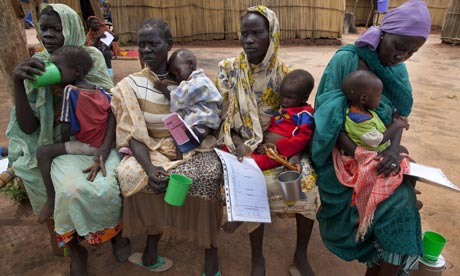South Sudan: Can South Sudan under Salva Kiir become a better place to be a woman?
|
Photo credit: Paula Bronstein/Getty Images |
When Navi Pillay, the UN high commissioner for human rights, visited South Sudan in May, she heard first-hand about the precarious situation many women face on a daily basis, from domestic violence to rape.
Civil society groups and individual women told her of the "extreme lack of rights" for women, particularly in rural South Sudan, and the "tyranny" of a dowry system – typically several cows – that encourages early and forced marriage in which neither mothers nor daughters usually have any say.
Pillay said her interlocutors painted a "very disturbing picture" of domestic violence, suggesting rape was fairly commonplace but rarely investigated. She was told of girls mistreated or sometimes killed for rejecting forced marriages. "Such terrible forms of discrimination should not be explained away as cultural practices that cannot be challenged or changed. I believe in cultural rights, but not in the cultural repression of half the population," said Pillay.
Her concerns reflect the tension between customary law and the transitional constitution in the world's newest state. The constitution sets the minimum marrying age at 18 and says neither women nor men shall be married against their will. In practice, some girls marry as young as 14. In Unity state, 24% of girls are married by 15 and 57% by 18, according to a 2006 government survey.
Read the complete story at The Guardian, published 10 July 2012.
|
Photo credit: Paula Bronstein/Getty Images |
When Navi Pillay, the UN high commissioner for human rights, visited South Sudan in May, she heard first-hand about the precarious situation many women face on a daily basis, from domestic violence to rape.
Civil society groups and individual women told her of the "extreme lack of rights" for women, particularly in rural South Sudan, and the "tyranny" of a dowry system – typically several cows – that encourages early and forced marriage in which neither mothers nor daughters usually have any say.
Pillay said her interlocutors painted a "very disturbing picture" of domestic violence, suggesting rape was fairly commonplace but rarely investigated. She was told of girls mistreated or sometimes killed for rejecting forced marriages. "Such terrible forms of discrimination should not be explained away as cultural practices that cannot be challenged or changed. I believe in cultural rights, but not in the cultural repression of half the population," said Pillay.
Her concerns reflect the tension between customary law and the transitional constitution in the world's newest state. The constitution sets the minimum marrying age at 18 and says neither women nor men shall be married against their will. In practice, some girls marry as young as 14. In Unity state, 24% of girls are married by 15 and 57% by 18, according to a 2006 government survey.
Read the complete story at The Guardian, published 10 July 2012.
